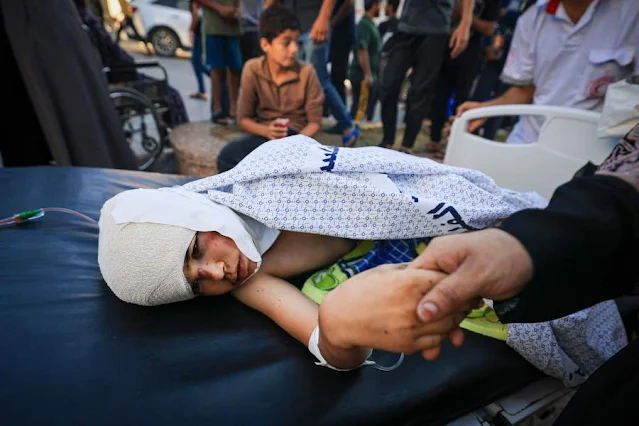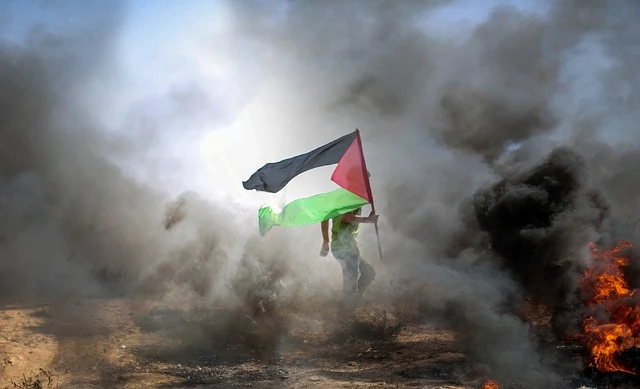The “Al-Aqsa Flood” operation (the 2023 Hamas attack on Israel), which was initiated by the Palestinian resistance in the Gaza Strip against the occupying state, represented a paradox in the Palestinian situation.
Which now can surprise, after Palestinian resistance has been receiving blows for the past seven decades.
Israel moved its ground forces about two weeks ago, as part of its retaliatory operation, which it began immediately after the attack, aiming to occupy the Gaza Strip and attempt to eliminate the Hamas movement and recover more than 240 kidnapped by various factions.
However, even though the ground operation took place this long ago, it did not achieve what Tel Aviv aspired to.
Especially after many Western military leaders tried to liken the ground war on Gaza to the American war on the Iraqi cities of Fallujah and Mosul.
Although the Battle of Fallujah may be slightly different from the Mosul War, both wars cannot be compared with the reality of the Gaza War, for many military, geographical, security, and social reasons.
 |
| Israel kills children in Gaza (AFP Pic) |
Wrong analogy
On October 25, the American website Axios quoted American officials as saying that US President Joe Biden shared Israeli Prime Minister Benjamin Netanyahu’s concerns regarding the Israeli plan for a ground attack on Gaza, which had not yet begun.
The website added that, despite Biden’s “full support for Israel” and its right to strike the resistance movement (Hamas), according to its claim, Biden worked systematically and precisely to delay the ground invasion of Gaza.
He also made it clear that America does not want Israel to act recklessly, or without taking US concerns into account.
According to the American website, Biden wants the Israeli invasion to be closer to what happened in Mosul in 2016, and not Fallujah in 2004 when the US army suffered heavy losses.
Therefore, the newspaper believes that for these reasons, Biden sent General James Glenn, who previously headed special operations for the US Marines, to advise the Israelis on their military planning.
More than two weeks after the start of the ground operation in Gaza, Al Jazeera news network revealed that an investigation team is open in the network’s “Sanad” agency.
I was able to analyze satellite images that showed the number of Israeli occupation army vehicles, their concentration locations, and their advance paths inside the Gaza Strip.
Al Jazeera Network added that the team relied on high-quality satellite images during the period from November 1 to 10, to analyze them in-depth and extract information through special software.
The analysis team concluded many pieces of information and indicators that indicate that the Israeli army suffered heavy losses during this period.
The total number of vehicles on November 8 reached 295, a decrease of 88 vehicles compared to the third day of the same month when the number of vehicles was 383.
Taking into account that the Al-Qassam Brigades spokesman had announced the complete or partial destruction of 136 military vehicles in the Beit Lahia and Beit Hanoun axis in the northern Gaza Strip.
Al Jazeera's investigations indicate that, more than two weeks after the ground operation, Israel has not achieved any major achievements on the ground.
Except for the barbaric killing of civilians and infrastructure, which analysts believe has refuted the American theory that slow progress in Gaza, similar to the battle of Mosul, can help Israel.
Huge contrast
In the same context, and while talking about the big difference between the nature of the battle in Mosul in 2016 and Gaza in 2023, military expert Hassan Al-Obaidi says that what the American experts talked about, that the Gaza war should follow the path of the Mosul war, is contrary to reality, the truth, and the field.
He explained that Mosul differs from Gaza in all areas, whether the force holding the land in 2016, namely ISIS fighters, or the nature of the forces attacking Mosul, or the city’s area, population, nature, terrain, and many other factors.
Al-Obaidi pointed out that Mosul was suffering from the occupation of an extremist terrorist organization, the subject of intense hatred from the residents of the city of Mosul, for more than 3 years.
In addition, the city of Mosul is geographically wide in terms of open spaces, and it has the Tigris River, which divides it into two parts.
In addition, the nature of the buildings there is dispersed and not contiguous to the same extent as in the Gaza Strip, with Mosul relying on its construction on the horizontal system rather than the vertical, which constitutes greatly influential factors during the development of military plans before battles.
On the other hand, about the military aspect, Al-Obaidi asserts that any army in the world, no matter how advanced it is, will not be able to achieve its goals in the Gaza Strip.
Pointing out that there is an entire underground city, represented by tunnels that reportedly extend more than 500 kilometers, and on several levels.
He added, commenting, saying: I see the impossibility of dealing with tunnels for Israel, as it does not know anything about them, whether related to paths, use, or anything else, such as the openings of these tunnels towards the surface of the earth, ventilation and transportation routes, missile and equipment stores, command and control centers, and all. These factors make any ground war in Gaza hell.
Regarding the progress made by the occupation army during the past days and his comment on that, Al-Obeidi confirms that the battle is continuing, that the invaders are suffering heavy losses, and that the surprises of the Palestinian resistance have not ended yet, and may not have even begun on the ground.
Different circumstances
In a related context, security and strategic expert Riyad Al-Ali says that the battle of Mosul is radically different in terms of the military context, as the besieged civilians in Mosul were rejecting the presence of ISIS, and were waiting for the Iraqi security forces to enter to liberate them from the organization’s fighters.
Al-Ali added that the Iraqi army and forces participating in the battle of Mosul were working to secure civilians fleeing the battle, which happened in all areas of Mosul except for the old Mosul area, noting that these factors are not available in the Gaza Strip.
The Israeli forces deliberately bombed the displaced people fleeing from the north to the south of the Gaza Strip, taking into account that the residents of the Gaza Strip supported the resistance and were opposed to the Israeli occupation.
This ultimately means that the Palestinian resistance enjoys a solid popular incubator that believes in what it does, according to Al-Ali’s expression.
As for the ideological dimension, sociology researcher Mustafa Ahmed believes that the ideological dimension of the war taking place in the Gaza Strip shows that the residents of the Strip believe in what the Palestinian resistance factions are doing.
They believe in fighting the Israeli occupation, without any signs of abuse against the people of the Strip during the period of Hamas’ rule of the Gaza Strip since 2007.
Pointing out that these signals are the opposite of what ISIS was doing to the residents of the areas it controlled in Iraq, including torture, killing, looting, and executions under false pretexts.
Reflecting on these reasons and implications, political and economic researcher Anmar Al-Obaidi believes that the attacks on unarmed civilians taking place in the Gaza Strip have caused heavy losses to the Israeli entity.
Especially since the Ministry of Defense summoned approximately 380,000 reserve soldiers, who were working in factories, companies, and others.
Therefore, the attempt to invoke the Mosul war plan cannot be achieved by Israel, which has always relied in its conflicts on lightning wars that do not exceed weeks.
This means that the extension of the war for the coming weeks will portend an economic disaster for Israel, in addition to the military and security disasters that will befall it, as a result of the resistance of the Gaza factions and the possibility of the conflict expanding to the countries of the region.
After 39 days have passed since the barbaric war waged by the Israeli occupation on the Gaza Strip, and more than two weeks after the launch of the ground operation, it seems that Israel has failed in all its military plans to storm the Strip and remain there.
What is above the ground is different from what is below it, and the nature of Gaza is unique militarily and geographically, which is why many observers have pointed out that a war like the Gaza war that is currently taking place has never been witnessed by humanity.



.jpg)